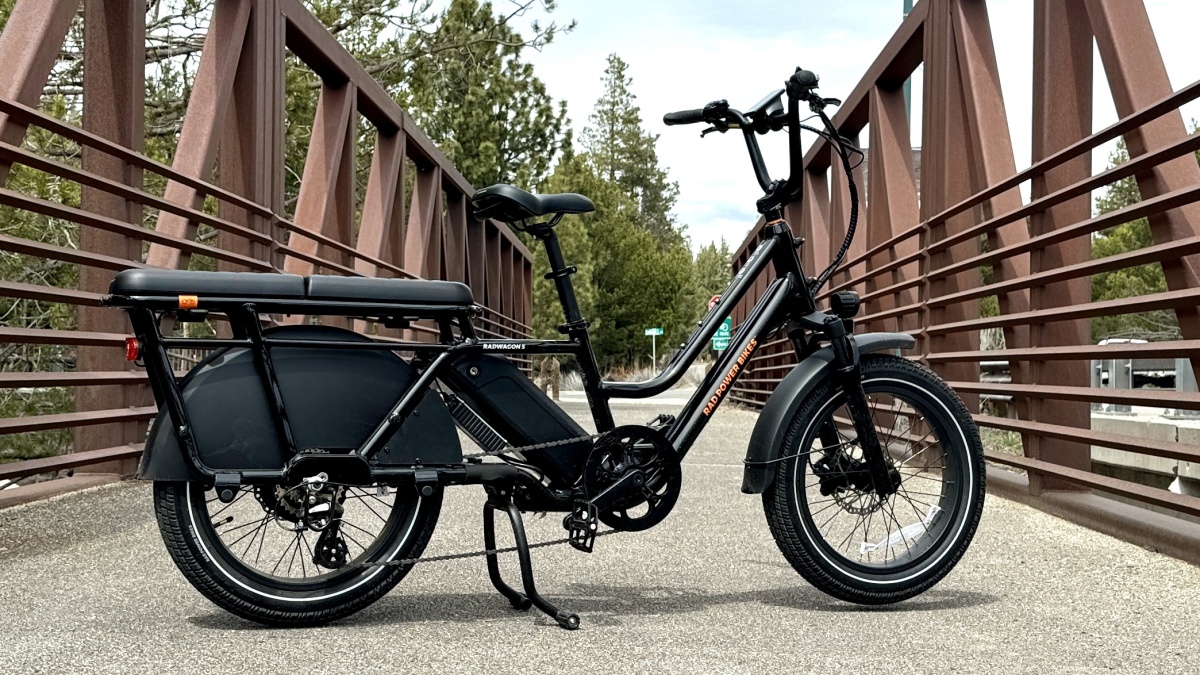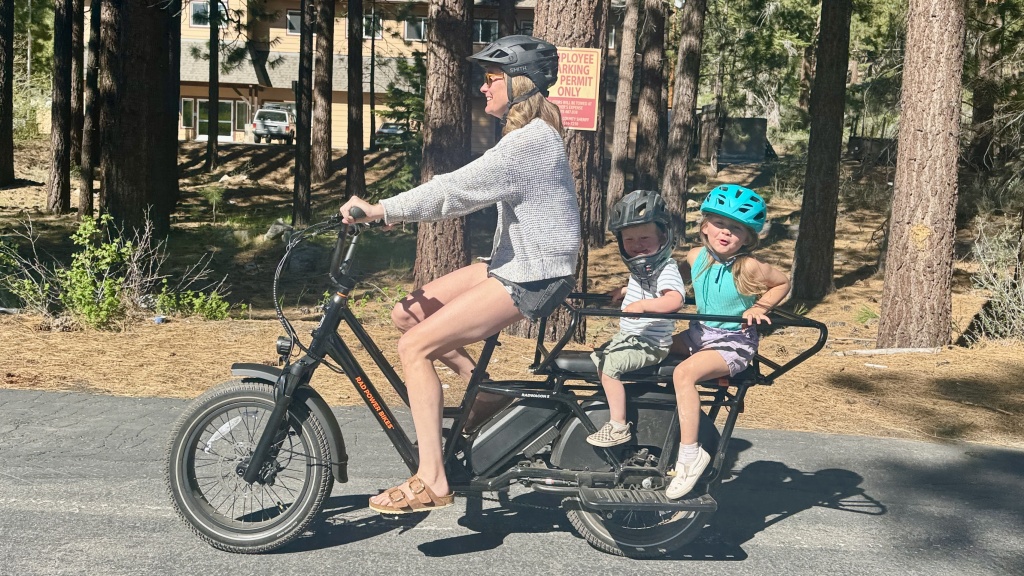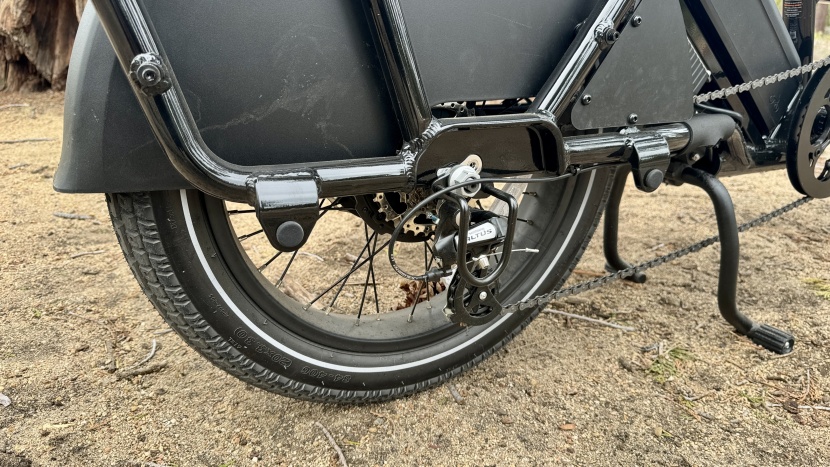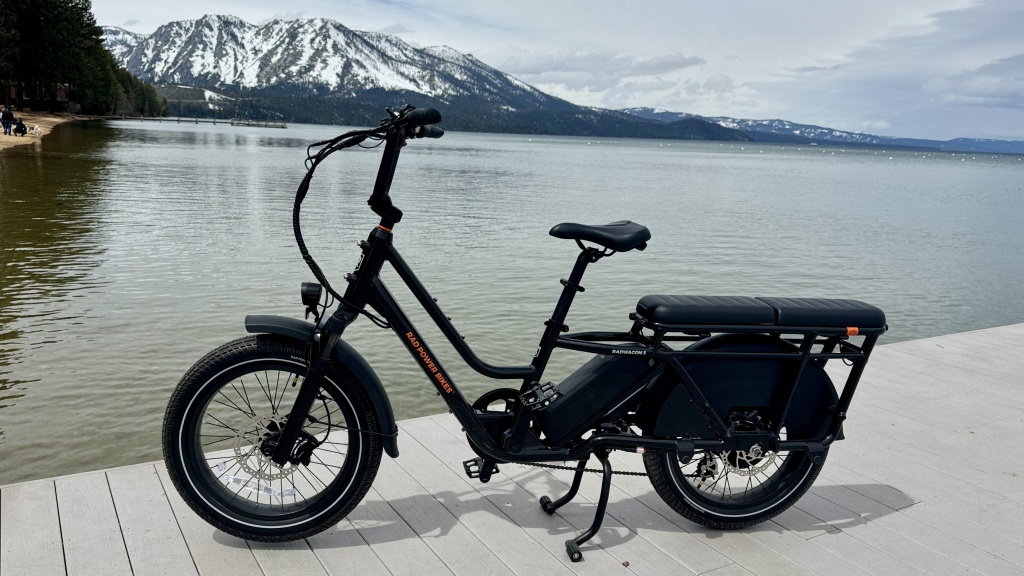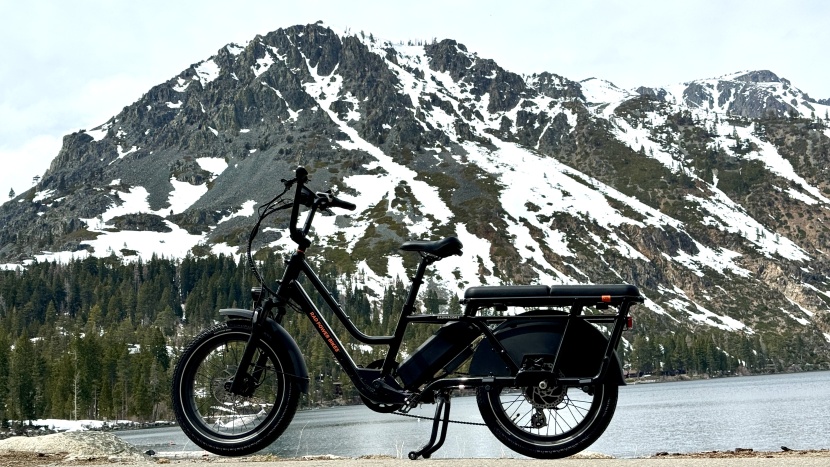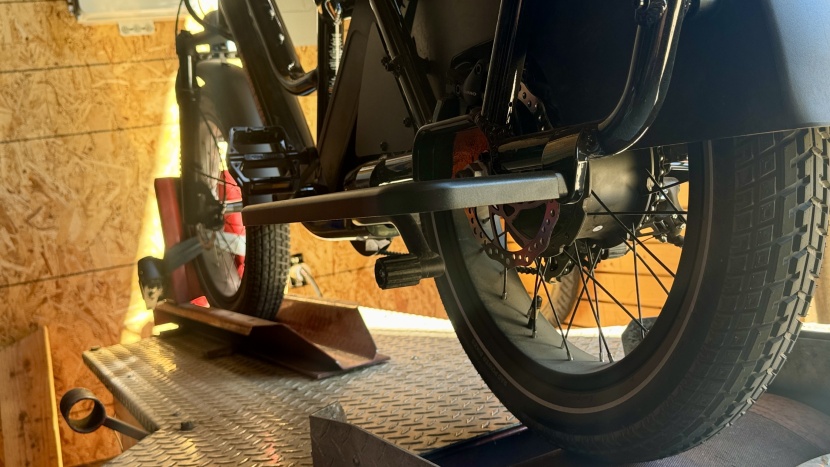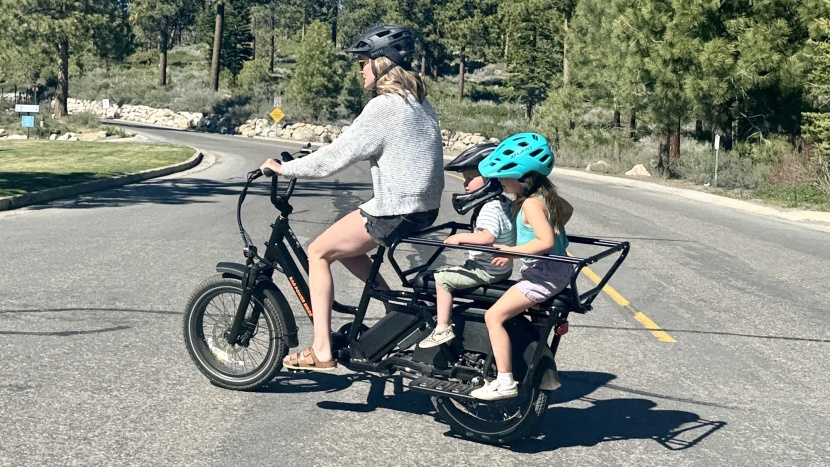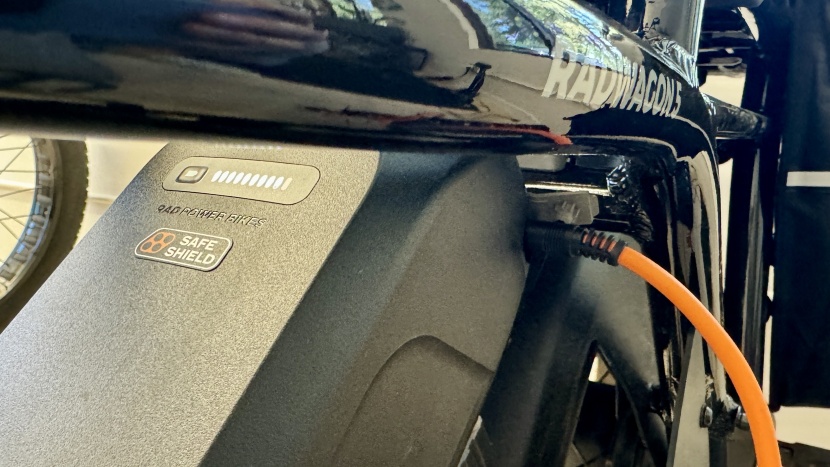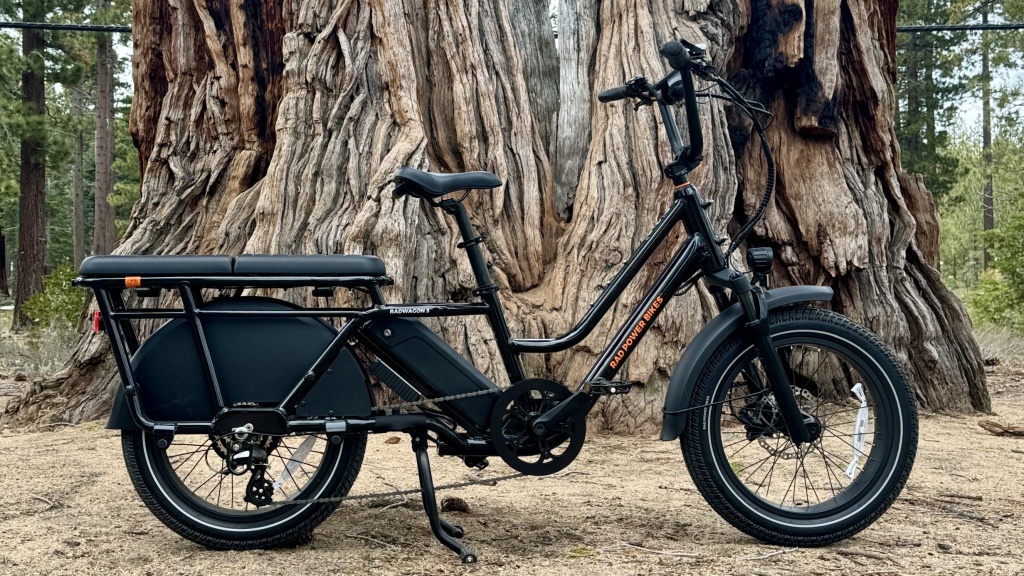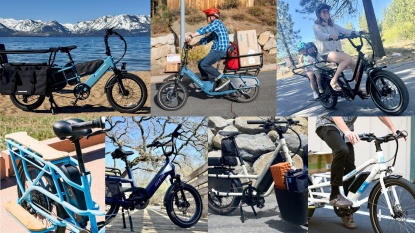Our Verdict
Compare to Similar Products
 This Product
Rad Power RadWagon 5 | |||||
|---|---|---|---|---|---|
| Awards | Most Stable Cargo Bike | Best Overall Cargo eBike | Funnest Cargo Bike | Best Compact Cargo eBike | Best Bang for the Buck |
| Price | $2,399 List $2,399 at Rad Power Bikes | $1,999 List $1,599 at Aventon Bikes | $2,800 List | $1,899 List $1,899 at Aventon Bikes | $1,399 List |
Overall Score  |
|||||
| Star Rating | |||||
| Bottom Line | Redesigned from the wheels up, this cargo bike takes a safety-first approach and has many new features that increase its appeal, but they also increase its heft | A well-thought-out cargo bike that offers a bevy of accessories to personalize for your preference. This bike is user friendly and can help you easily replace car trips with its carrying capacity | Incredibly well designed bike that is easy to live with and can be very useful in reducing car trips. While not inexpensive, the power, range and versatility of this bike set it apart. We didn't love all the accessories but they stand to increase its usability nonetheless | A pleasure to ride and incredibly useful; we loved how easy it was to park, store, and maneuver around town | Excellent value and a user-friendly package make this a bike that can easily transform your commute for years to come |
| Rating Categories | Rad Power RadWagon 5 | Aventon Abound | Specialized Globe H... | Aventon Abound SR | Lectric XPedition 2.0 |
| Ride (25%) | |||||
| Range (25%) | |||||
| Power (20%) | |||||
| Cargo Carrying (15%) | |||||
| Interface (10%) | |||||
| Assembly (5%) | |||||
| Specifications | Rad Power RadWagon 5 | Aventon Abound | Specialized Globe H... | Aventon Abound SR | Lectric XPedition 2.0 |
| Wheel size | 20-inch | 20-inch | 20-inch | 20-inch | 20-inch |
| Battery Size | 720 Wh | 720 Wh | 772 Wh | 720Wh | 624 Wh (1248 Wh Dual) |
| E-Bike Class | Class 1, 2 or 3 | Class 2 | Class 2 or 3 | Class 2 | Class 1, 2 or 3 |
| Motor Power | 750W | 750W | 700W | 750W | 750W |
| Sensor | Torque | Torque | Torque | Torque | Torque |
| Number of pedal assist settings | 5 | 4 | 5 | 3 | 5 |
| Top speed throttle | 20 mph | 20 mph | 20 mph | 20 mph | 20 mph |
| Top speed pedal-assist | 28 mph | 20 mph | 28 mph | 25 mph | 28 mph |
| Measured Distance Range | 25.0 miles | 37.4 miles | 31.9 miles | 28.4 miles | 21.9 miles (43.1 miles with dual battery) |
| Charging time (standard charger) | 7.5 hours | 6.6 hours | 6. 4 hours | 4.6 hours | 6.5 hours |
| Frame material | Aluminum | Aluminum | Aluminum | Aluminum | Aluminum |
| Total Weight Limit | 375 lbs total capacity (up to 120 lbs on rear rack) | 440 lbs | 419 lbs | 440 lbs | 450 lbs total capacity (up to 300 lbs on rear rack) |
| Measured Weight | 88 lbs 1 oz | 84 lbs 5 oz | 80 lbs 8 oz | 81 lbs 6 oz | 81 lbs 5 oz (89 lbs 14 oz w/dual battery) |
| Wheelbase length | 50.7-inches (1288 mm) | 50.16-inches (1274mm) | 43-inches (1089mm) | 45.3-inches (1152mm) | 54-inches (1372mm) |
| Drivetrain | Shimano Altus 7-speed | Shimano Tourney 7-speed | MicroSHIFT 9 Speed | Shimano Altus 8-speed | Shimano Altus 8-speed |
| Brakes | Tektro Hydraulic Disc | Hydraulic | Tektro Hydraulic | Tektro Hydraulic | Hydraulic |
| Additional features | Fenders, front and rear lights, rear cargo rack, telescoping seatpost, adjustable handlebars, mounts for accessories, deflopilator, USB-C port | Fenders, front and rear lights, rear rack, kickstand, running boards | Fenders, front and rear lights, rear rack, bell | Fenders, front and rear lights, rear rack, locking kickstand, Aventon ACU with 4G/GPS, suspension fork, suspension post | Fenders, front and rear lights, rear rack, center kickstand, dual battery capability, suspension fork |
| Warranty | 2 year | Lifetime for frame if registered, 2 years | Lifetime (2 year on battery and motor) | 2 year | 1 year |
Our Analysis and Test Results
Rad Power completely redesigned the RadWagon; this 5th-generation family hauler is safer, more capable, and more comfortable than ever. The utilitarian cargo carrier of the Rad line arrives ready for you to customize. Whether you choose to outfit it with bags and buckets or racks and kids' seats, this bike can handle the load. RadPower offers a wealth of accessories that allow you to customize it for your unique needs. The bike seems to prioritize safety and ride quality, which results in a delightful but heavy bike.
Ride Quality
The RadWagon 5 rides like an American car from the 70's. With its long wheelbase and heavy wheels, it lumbers along with a calm, predictable feel. The bike is still powerful, but its mass is center stage, passing its stability to the rider and cargo. The bike feels confident and safe, only presenting itself as sporty to someone who's never ridden an e-bike. The words quick and agile just aren't in its lexicon, but that's part of its appeal. Hauling around your kids, pets, groceries, or other cargo isn't the time to feel quick and zippy.
This RadWagon 5 is a significant departure from the ride feel of the RadWagon 4, and there are numerous reasons for this. The bike now rolls on 20 x 3.3" tires instead of Rad's proprietary 22 x 3.0 tires, and they feel heavier, more stable, and offer more dampening. The battery has moved from the downtube to behind the seat tube, giving the bike a lower and more central center of gravity. The old rigid fork and quick-release front axle have been swapped for a suspension fork with a bolt-on thru-axle, giving the bike more comfort and stability. The handlebar and stem have been updated to a BMX-style bar and 4-bolt stem, giving the front end a much more solid feel. The battery is now larger, with 720 Wh of power, the motor has more torque, and the brakes are now hydraulic instead of cable-actuated. These are all welcome upgrades that contribute to more safety and comfort, but they also add quite a bit of weight. This bike tips our scales at 88.1 pounds, almost 12 pounds heavier than the RadWagon 4, and that's before we added accessories.
The RadWagon 5 is almost three inches shorter than its predecessor, but you wouldn't know it; this bike feels massive. We typically deride heavier bikes and speak only to the negative aspects of their handling and portability, but there's also an upside. The stout and sturdy feel is confidence-inspiring when loaded and feels remarkably serene even at its enhanced top speed. Its handling is dull, with no wobble or wiggle and certainly no adrenaline; this bike is true to its purpose of safely hauling you and your precious cargo around. I didn't weigh the wheels on the previous bike, but the new wheels feel heavier, and the tire casing feels a bit thicker. They provide a smooth, absorbent feel and do a great job isolating the bike's occupants from cracks, bumps, and uneven pavement. Tektro hydraulic brakes with 180mm rotors have no problem bringing the bike to a stop, even when fully loaded.
The 20-inch wheels allow the frame to be a bit lower, giving the bike a convenient 21" step-through height. Rad claims the bike will fit riders from 4'11" to 6'3", and based on our testing, that seems totally reasonable. The new handlebar and stem setup has less height adjustability than the previous model, but it's a welcome trade-off for the sturdiness it adds. A telescoping seatpost gives the seat a whopping 11.5" of adjustability. Like most other cargo bikes, the riding position is casual, relaxed, and upright. Having a motor means setting the proper pedaling height is less important, and you can instead set the saddle height to have your feet rest flat on the ground.
The grips are girthy and high-quality, and the twist throttle is almost seamlessly integrated into the right grip. The saddle is on the firmer side but wide and supportive, with a handle underneath that allows you to pivot the bike when parking. Passengers can also use the handle if they're not using the Caboose or Deckhand available from Rad. The maximum rider weight is 265 pounds, and the maximum weight for the rack is 120 pounds. The maximum total payload is 375 pounds (their math, not ours).
While the RadWagon 5 doesn't include cargo accessories, it's not a bare-bones offering. The bike has full fenders and a rear wheel guard to keep straps and little feet out of the spokes. It also has a 200-lumen headlight and a tail light with built-in turn signals. This isn't the first cargo bike we've reviewed with turn signals, and we're finding them more useful than we first thought. When riding a cargo bike, especially a fully loaded cargo bike, taking your hand off of the handlebar to signal can feel precarious, so having an easily accessible digital turn signal is great. All of the bike's lights run off the main battery, meaning you'll never have to swap out AA batteries or remove lights to charge them separately. The kickstand has been updated, and it's top-notch, featuring super wide and replaceable feet that can support the bike on soft surfaces. The kickstand deploys easily from either side of the bike and features a welcome quiet-close mechanism. This might seem trivial, but so few companies have gotten the kickstand right on a cargo bike; it's all too often loud, hard to deploy, or unstable, and Rad nailed the task here.
Range
There's much to say about the new battery; Rad is taking the lead in offering a Safe Shield Battery featuring thermal-resistant technology. While I haven't personally experienced catastrophic failure with e-bike batteries, stories of people who have are not rare. Rad seeks to prevent those issues by encapsulating each cell with a heat-absorbing resin. I can't speak to its effectiveness, but it's nice to see some manufacturers being proactive about safety and trying to prevent fires.
The 720 Wh battery has more capacity than the previous model, but the bikes' increased weight and smaller wheels decreased the bike's range. We rode the RadWagon5 for 24.96 miles using only the throttle in the bike's most powerful setting while conquering 1364 ft of elevation. The battery management system gives you an expected range on the screen. The range wasn't incredibly accurate when on hilly terrain, as the bike couldn't foresee elevation changes. While the uphills take a heavy toll on the battery, the downhills do little to help recover the range. My ride began with a stated range of 69 miles, but that depleted quickly; toward the end of the ride, the range became more accurate, and the bike powered a few hundred meters beyond its zero range reading. This test ride lasted 91 minutes, yielding an average speed of 16.5 mph. Rad Power claims this bike has an “up to 60-mile range,” which I'd estimate to be accurate. If I had performed this test on level ground while adding some pedal power, I likely could have ridden 60 miles.
The RadWagon 5 rates about average in our range metric. Given the bike's additional mass, we didn't find this too surprising. Having less range than the outgoing model is a little disappointing, but the trade-off for additional comfort and safety features is a safe bet on Rad's part. Realistically, the bike is probably sufficient for most people's commuting needs, but riding it home with a dead battery is something we'd go to great lengths to avoid.
Power
Using a 750W geared hub motor, the RadWagon 5 isn't unique in the cargo bike class. What is unique is this hub's width; it's wider than most geared hub motors, which creates more space for magnets and gearing. Theoretically, this should also create a more reliable motor with better cooling. The 750-watt figure is the nominal wattage the motor is rated for; the actual power at the wheel we pulled from dyno testing this bike was 1031 watts and 35.6 Nm of torque.
The motor and controller offer smooth power delivery, providing a calm ride without jumpy acceleration. New for this version of the RadWagon is the ability to switch between classes easily. You can drop the kids off at school, switch the bike into Class 3 mode, and zoom off to work at speeds up to 28 mph. There are still five pedal assist levels, and each one is noticeably different in its support.
The bike's twist throttle is smooth and pulls you from a stop with seemingly no effort. Acceleration isn't exactly brisk, but it's likely faster than you could propel the 88-lb bike with your legs alone. There is no twitchiness to the acceleration like you typically find with hub motors; the bike feels quite refined in its acceleration and power delivery. Adding a torque sensor means the bike no longer guesses how hard you're pedaling; it reads your input at the bottom bracket and responds with the appropriate boost. For this reason, we strongly prefer bikes with torque sensors over cadence sensors; Rad's torque sensor is good but not quite as seamless as others we've tested. The throttle speed is uncoupled from the pedal assist setting, meaning you have full throttle power regardless of your chosen setting. We appreciate this aspect of power delivery because it allows you to use the throttle as a backup for pedal assistance. Sometimes, you might want a little more oomph for a hill or passing power, and it's readily available no matter what pedal assist setting you're riding in.
Cargo Carrying
The RadWagon 5 is about more than just how much it can carry. The bike's new design added about 25 lbs to its total carrying capacity, but the new rack is rated the same as the outgoing model at 120 lbs. While this isn't class-leading, it's more than reasonable for most people to carry on a rack. The 28" long rack is 7" wide and made of tubular aluminum with several clever attachment points. Without adding any attachments, you can strap or tie any number of items to its crossbars. We purchased two “Deckpad” seats, a set of running boards to rest feet on, and the “Caboose,” which contains small passengers. The Deckpad seats install with a hand-tightened knob and look like big baguettes. Despite being made for this bike, their fit doesn't feel super secure; we added a little foam beneath, and they tightened up to our liking.
Rear wheel covers are standard and stop straps, buckles, or little hands and feet from touching the wheel. As we've said in other reviews regarding cargo bikes, their utility is really unlocked by outfitting them with accessories, and Rad has accessories galore. There's even a canopy to keep your kids out of the sun, from kid's seats to locking panniers to pet carriers. RadPower offers numerous baskets and bags to maximize the bike's carrying capacity. Their specialty, and where this bike excels, is for carrying kids. Thule Yepp kid's seats are available for kids up to 40 pounds. The caboose we tested is best suited for kids up to 7 and can be used with the Yepp seats. The Caboose does a good job keeping kids confined, and dual handrails allow little ones to hold the inner rail and not be pinched should the outer rail contact a foreign object. We've seen better implementations of this type of kid corral, some with foam padding on the inside, and notably, Rad's Caboose leaves space behind the seat that our kid testers didn't appreciate as their bottoms could fall into the gap.
Bigger kids can utilize the “Deckhand” handlebars that bolt directly to the rack, giving them an active riding feel. The RadWagon is one of the best kid haulers you can buy; it provides a smoother ride than the Aventon Abound but can't haul quite as much.
User Interface
The user interface on the RadWagon 5 is a significant upgrade from the past model and one of the best we've seen on an e-bike. The large, centrally placed color screen has vivid graphics, low latency, and a well-thought-out user interface. The controls are now closer to the user's thumb and a bit easier to use; this comes in handy when using features like turn signals. The rectangular 6-button controller is situated in such a way that all of the buttons are easily accessible. The top of the controller has the bike's power button; it's the only one that isn't easy to reach while riding, which makes sense. The face of the controller has four buttons: up/down control the bike's pedal assist modes, and left/right control the built-in turn signals. Rad isn't the first company to offer turn signals integrated into the tail light, and we like the idea but aren't sure if motorists actually notice them. One thing is clear about this bike: Rad adopted every safety feature available. A long press of the “up” button switches the bike's lighting system on/off while holding the down button puts the bike in walk mode, where the motor will push the bike along at a gentle walking speed. A button on the bottom of the controller switches between screens.
The 4" color screen sits in the center of the handlebar, clearly in your line of sight and bright enough to see even in full sun. There is a USB-C charging port on the display's underside. Should you choose to mount a phone to the handlebar for navigation, being able to plug your phone in will allow you to keep the screen running. The UI and UX of this screen are exceptionally good; the speed is displayed in the center in large format, and the battery is depicted visually at the top of the screen in a long cylindrical battery. The state of charge is shown in the battery with a solid vs. empty block, much like a tablet or phone, but also as a remaining range number below your current speed. Below your current speed are the pedal assist modes with your current mode highlighted. Turn signal indicators flash to the left or right of your current speed. The top of the screen shows the current wattage and an odometer. The secondary screen displays trip distance, trip time, and class level.
The 720Wh UL Certified battery pack has been moved behind the seat tube and is now slightly lower than on the previous model. It feels a bit harder to access for charging, but the trade-off of having better weight distribution feels worthwhile. The charge port sits just below the rack's support bar, so it can be tricky to find the first few times. The battery is locked onto the frame and can be removed for charging away from the bike, a handy feature if you park outside or aren't near an outlet. Additionally, the battery can be switched off with the key, which prevents someone from removing the battery or powering the bike on, a useful feature when locking the bike up. A full charge took us approximately 7.5 hours using Rad's 48V 2A smart charger.
Assembly
The RadWagon 5 comes in a box with a removable top, eliminating the need to lift the bike out of the box. Sliding the cover off reveals the mostly assembled bicycle, with the handlebar and front wheel being major exceptions. There are some minor exceptions, like pedals, a front fender, and the display must be mounted, but those are simple tasks. The most difficult part of assembly is simply wrestling the bike around. If you follow the directions, they show how to use the bike's kickstand to your advantage, but we'd still recommend having a second set of hands around.
The printed instructions are detailed and thorough, and all the tools needed are provided. The bike isn't lightweight or small, so it is useful to have a roomy area to assemble it. Much of the assembly process involves removing protective packaging, reading warning labels, and adjusting for fit and comfort.
Should You Buy the Rad Power RadWagon 5?
The RadWagon 5 feels like a highly evolved machine with many comfort and utility features. The bike is great for hauling kids, useful for cargo, adept at errands, and incredibly user-friendly. It provides excellent ride quality, and while enjoyable, it isn't necessarily fun. Rad's primary focus in redesigning this bike was safety, which makes it as exciting as an old Volvo wagon. That said, it does its job well and feels like a reasonable value; it should at least make your shortlist.
What Other E-Bikes Should You Consider?
For less money, you can pick up the Lectric XPedition 2.0, which offers more cargo capacity but a slightly less refined ride. The XPedition is available with two batteries for the price of the RadWagon, giving it substantially more range, but it doesn't feel quite as stable to ride. If you want RadWagon stability in a more fun package, check out the Aventon Abound SR. It's also wildly customizable and can haul up to 440 lbs.


